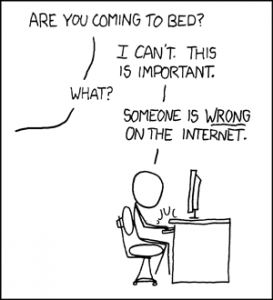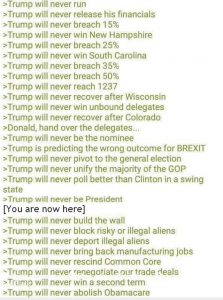The internet offers an endless stream of analyses and opinions. On this blog, I sometimes comment on articles written by people who have a large audience. My disagreement with better known commentators is regularly confused for arrogance. “What do you know, dude? You are a blogger, the other guy is a professor.” Such statements show how easily people refer to authority1 instead of critically evaluating the arguments.

When I point out dubious logic, that does not mean the authors have nothing interesting to say. Quite the contrary, I often agree with them on many points. But pinpointing disagreements and calling assumptions into question can be very insightful. So when I critique for example Paul Krugman or Geert Noels, I’m not saying “neglect these fools”. I hope that readers will take into account my point of view, and confront it with that of others. I am no contrarian for the sake of being a contrarian.
This ideal dynamic is illustrated by historians David Wootton and Joel Mokyr. Mokyr’s book A Culture of Growth: The Origins of the Modern Economy explains why Western Europe was the first region in the world to make sustained technological and economic progress. In his review, Wootton summarizes the thesis put forth in the book. Then, he argues that the story is incomplete. In the comments below the review, both gentlemen defend their points of view.
That is one of the advantages of the internet. Well-informed contributors can quickly challenge opinions. I have learned a lot over the years from (often anonymous) online commentators. It is a shame many media have closed down the comment sections. Blocking feedback does not add to their credibility.
I would advise scientific journals to enable comments as well. Papers go through peer-review before they are published, but the reader cannot see these discussions. Commenting on a scientific article via a new publication takes a lot of time. Getting out new results and contradictory information faster would accelerate learning in all disciplines. Blogs can also expose disinformation.
If you don’t agree with me, you can always let me know in the comments!
Update 17/05/2017: Chris Said has a nice blog post on different levels of understanding. He calls the dialectic process of reaching the next level ‘Learning by flip-flopping‘. Open discussions as I advocate above are the means to transcend your previous, more basic knowledge.

